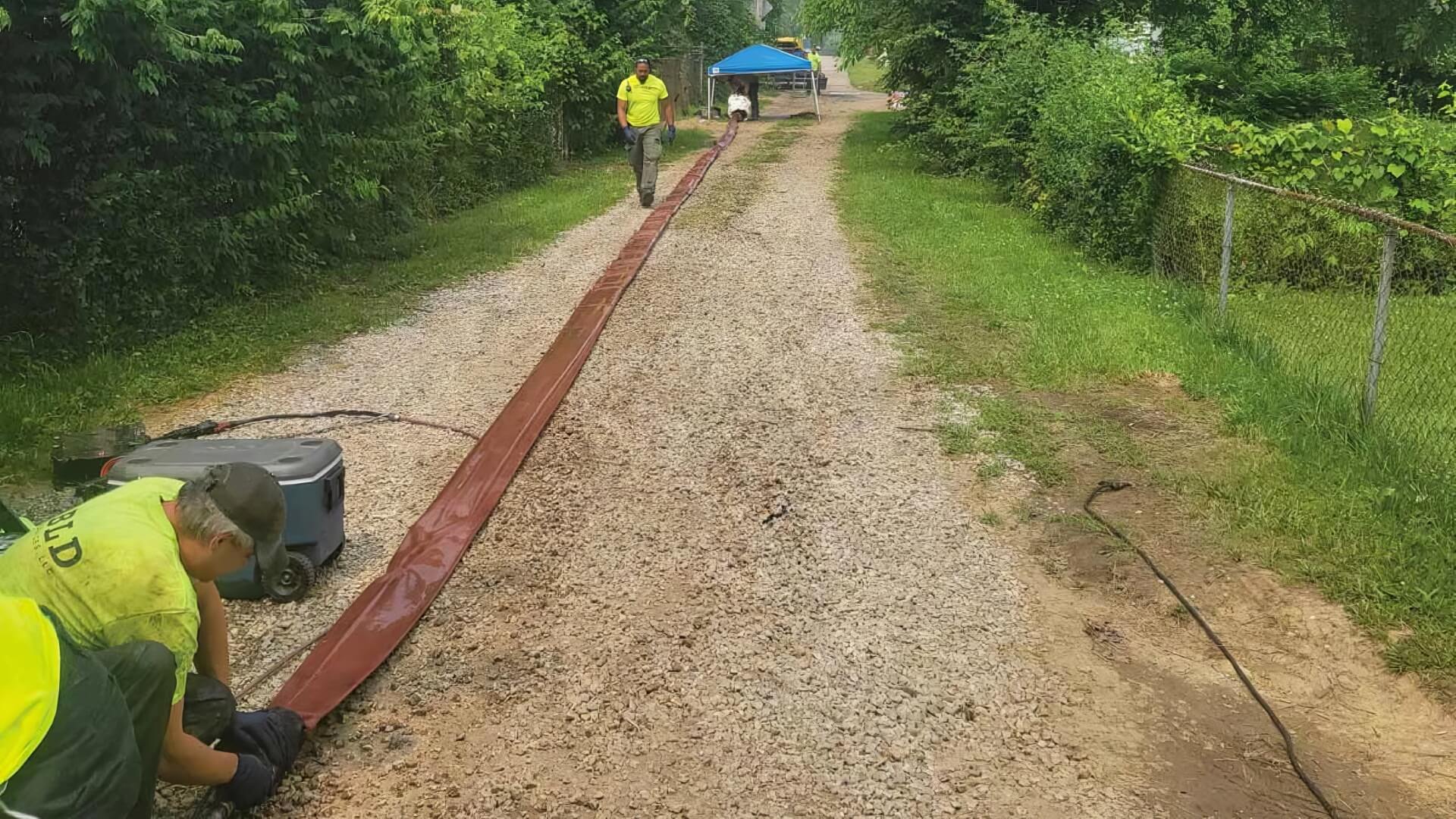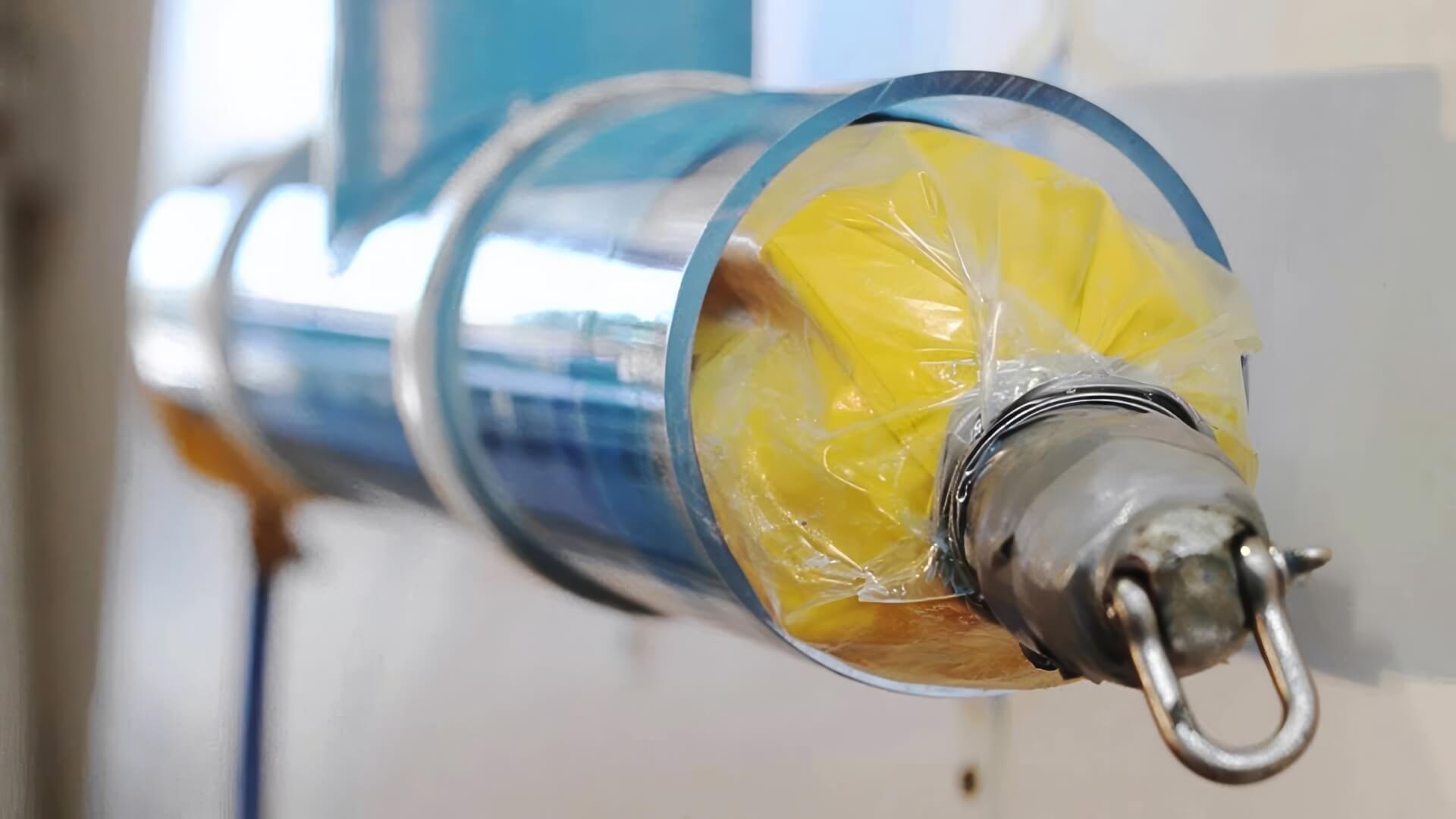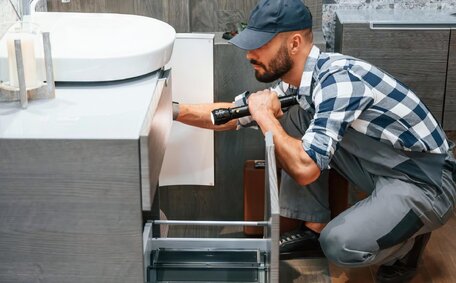Introduction to Drainage System Maintenance
Maintaining a healthy drainage system is essential for preventing common issues like clogs and buildup. Without regular maintenance, all drains can become clogged with hair, soap scum, and other debris. Left unchecked, this results in diminished water flow, backups, flooding, and costly repairs that disrupt your home’s drainage system.
Proactive maintenance, regular inspections, and discerning when to consult professionals play a pivotal role in preventing drainage problems. DIY measures like drain guards, bacterial cleaners, frequent hot water rinses and judicious use of these guards are all effective.
At Padstow Plumbing, your local Padstow experts, we specialise in eliminating obstructions such as hair and food waste from drains, ensuring comprehensive care for your home’s plumbing. At Padstow Plumbing, we offer expert tips on how maintain healthy plumbing, fully licensed and equipped to swiftly address any drainage problems that arise in local homes and businesses.
Using Drain Guards to Prevent Clogs
Fitting drain guards is an effective strategy to shield your drainage from clogs caused by hair, food remnants, and other materials. Drain guards come in a variety of materials, including plastic and metal, tailored for different uses:
- Your sink drain guards aid in preventing debris from going down your drains, halting buildup within the pipes.
- Shower drain guards capture hair and soap residues, preventing them from entering the drainage system.
- A drain guard, small but effective, acts as a filter for your kitchen’s garbage disposal, entrapping food scraps and tiny particles from entering the plumbing system.
Ensure to clean your drains regularly, even with guards, using hot water and soap, followed by a thorough rinse to maintain clear pathways.
Regularly inspect the bottom of drain guards for residue that could cause blockages and further issues.
It’s crucial to routinely maintain drain guards to fend off debris from infiltrating your pipes. Sink and shower guards can be lifted out for quick drain access when needed.
Natural Drain Cleaning Solutions
Using everyday substances occasionally not only keeps your drains clean but also curtails the use of harsh chemicals that may pollute water sources.
Baking Soda and Vinegar
An easy home remedy for unclogging is mixing vinegar and baking soda. Combine 1⁄2 cup of baking soda with 1 cup of vinegar, introducing the mixture to the drain swiftly. The ensuing chemical reaction produces fizzing and bubbles that safely maintain your drainage by helping dislodge hair, other gunk, and grime that build up.
Conclude the process with an ample hot water flush.
Boiling Water
Pouring boiling water down the drain is superb for preventing food waste build-up and dissolving accumulated fats and oils.
Carefully pour a full kettle of freshly boiled water down the drain. Additionally, the hot water works to eradicate bacterial and fungal growth that might occur in bathroom sink drains. Perform this maintenance at least once a week or as necessary to keep your drains clear and ensure pipes remain unobstructed.
Enzymatic Cleaners
Enzymatic drain cleaners are effective at breaking down organic materials such as food scraps, oils, hair, and soap scum. They represent a safe maintenance option compared to using drain cleaner with chemicals. Heed the instructions on the product, noting its suitability for particular pipes and drainage usage trends.
Employing natural solutions for cleaning your drains whenever possible is the safest DIY approach for routine maintenance, reflecting how can fix minor blockages yourself. They eliminate the need for toxic fumes and help homeowners know how fix clogged drains using safer alternatives. For significant drain backups or overflows, consult plumbing professionals for adept solutions.
Monitoring Water Pressure
Maintaining water pressure throughout your plumbing system at all time can alert you to issues before they become major problems. Sudden changes in water pressure can indicate blockages or leaks in the pipes.
How to Check Water Pressure
Most residences feature a water pressure gauge near the main shutoff valve, a handy tool for when things go awry in monitoring a healthy drainage system. The ideal water pressure range is between 310 and 550 kilopascals (kPa). Note the pressure and observe for consistency over time - it should stay relatively stable.
Large fluctuations in pressure readings may indicate:
- Partial blockage from sediment, scale buildup, or trapped debris
- Whole house filter needing replacement
- Fixtures supplying insufficient water flow
- Leaking pipes that permit precious water to get wasted
Routine monitoring and recording of water pressure is vital for maintaining your drainage system’s health. Staying vigilant against abnormal pressure shifts enables professional plumbers to conduct thorough inspections where necessary.
When to Call a Professional
DIY monitoring can be an early warning system, but it has limitations in identifying specific causes or locations of plumbing issues. If problems with pressure persist or raise concerns, it’s important to have a plumber perform a comprehensive system examination. We can conduct thorough diagnostics tests, detect leaks, and remedy any maintenance needs.
Knowing When to Call a Professional
While regular drain maintenance is crucial, it’s important to know that DIY methods have limitations. It’s crucial to recognize when to call professional help to avert potential plumbing disasters.
Contact a licensed plumber immediately if you encounter blocked drains or related issues:
- Complete drain blockages not cleared by boiling water or drain snakes.
- Multiple drains your home synchronously backing up, which could indicate severe blockages.
- Foul sewage smells coming from drains or toilets.
- Leaking water around pipes, walls, floors or ceilings.
- Visible mould growth around your bathroom and areas like showers, sinks, or places where wet wipes and sanitary items might be disposed of.
Severe blockages can overwhelm drains, inflict interior water damage and should prompt a call to a professional plumber to prevent hazardous gases from invading your living spaces if left untreated. If neglected, even minor leaks in your plumbing can eventually weaken the very foundations of your home.
at Padstow Plumbing, we offer professional equipment, diagnostic technology and deep experience to resolve any complex issues that affect your home’s drains. We’re available 24/7 - get in touch with us at jobs@padstowplumbingservices.com.au or call 1300 349 338.
The Environmental Impact of Drain Maintenance
Traditional chemical drain cleaners can harm ecosystems. Many alternatives are gentler and more eco-friendly for your drains. Because using drain cleaners with toxic ingredients, like sodium hydroxide and sulfuric acid, contaminates groundwater and harms ecosystems, alternatives should be considered.
Fortunately, there are various ways to maintain healthy drainage without causing environmental harm, by opting for more considerate alternatives:
Enzymatic Drain Cleaners
Biological enzymatic cleaners adeptly break down organic waste without resorting to harsh chemicals. Bacteria and enzymes biodegrade hair, grease, food scraps, soaps, and paper into harmless byproducts.
You can do wonders for a blocked drain with a homemade cleaner that features the combination of vinegar baking, along with boiling water, which is completely non-toxic. This combination helps dissolve gunk and odour-causing bacteria, leaving drains clear.
Preventative Measures
Fitting drain guards, deploying strainers, and being diligent to avoid flushing non-flushable items help prevent unwanted materials from slipping into your drains. This lessens the need for harsh chemical cleaners.
Transitioning from toxic chemicals to eco-friendly solutions is better for the environment and can save money while keeping drains clear. We would advocate for these simple, eco-friendly methods first before resorting to commercial chemical drain openers.
DIY vs Professional Drain Cleaning
When faced with a clogged or slow-flowing drain, many homeowners first try DIY methods using boiling water, plungers, snaking cables, commercial liquid drain cleaners or homemade solutions.
DIY drain cleaning can address minor blockages but may not fully handle the complexities of a plumbing distribution system:
- A cable auger, often referred to as snaking cables, can scratch pipe walls and sometimes break inside drains.
- Chemical cleaners can corrode pipes, which is why homeowners can use less aggressive natural alternatives for maintenance.
- Slow-draining sinks may indicate ventilation issues only professionals can diagnose.
Situations where professional expertise is beneficial include:
- Drain blockages reoccurring after attempts to clear.
- Multiple drains backing up simultaneously.
- Lingering sewage odours throughout the house.
- Visible water damage from pipe leaks causing mould or soggy drywall.
As licenced plumbers, we have the necessary equipment for bigger jobs, including the latest camera technology and advanced hydro-jetting to thoroughly clean drains and diagnose underlying problems regular homeowners can’t detect or fix.
We also adhere to stringent environmental regulations regarding proper chemical handling and waste disposal, which are vital health and sustainability considerations that can get overlooked by DIYers.
For thorough drain unblocking, inspections, cleaning, and repairs, rely on Padstow Plumbing. Call 1300 349 338 or email jobs@padstowplumbingservices.com.au.
Seasonal Drain Care Tips
Knowing how to maintain your drains with commitment throughout the year is beneficial, especially during changing seasons, to guarantee they receive optimum care before issues become pronounced.
Spring
With increased drainage use in spring, it’s crucial to apply varied methods to maintain a healthy system among debris from showers, gardening, and outdoor activities. Ensure your plug holes are cleared of drain guards’ winter buildup and check out the foundation drains in your home for any blockages. Schedule a professional drain inspection to address any issues before summer.
Summer
The arid conditions during summer months may lead to drainage pipes contracting and shifting, making it essential to wash down any accumulated residue essential for washing out accumulated pipe residue. Flush your drains with a kettle of boiling water to maintain consistent flow and clarity, ensuring pipes remain unobstructed. Look for signs of sluggish drainage and sewage smells that indicate a biological buildup.
Autumn
Autumn leaf debris can get blocked in garden drains and wreak havoc on outdoor drainage areas, especially if leaves get trapped in the system following a bath for your pet. Clean accumulated leaves around foundation drains, window wells, driveway grates and street gutters to prevent storm drain clogs. Avoid blowing or raking leaves directly over drains.
Winter
Freezing winter temperatures can cause pipes to burst and crack if cold water inside expands. Pour salt down outdoor drains to prevent freezing and have an emergency plumber on standby.
Let taps drip during subzero weather to help maintain healthy drain pressure and avoid pipe bursts. Check vents for blockages from snow and ice.
Padstow Plumbing encourages scheduling seasonal drain inspections and maintenance to prevent problems. Contact us today at 1300 349 338 or jobs@padstowplumbingservices.com.au to book an appointment.






